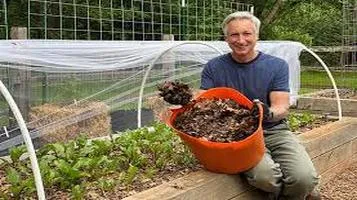Mulch: The Unsung Hero of Gardening
Mulch is a material spread over the surface of the soil to enhance its quality and appearance. It serves multiple purposes, including retaining soil moisture, suppressing weeds, regulating soil temperature, and preventing erosion. Mulch can be organic or inorganic. Organic mulches, such as wood chips, straw, grass clippings, and shredded leaves, decompose over time, enriching the soil with nutrients. Inorganic mulches, like gravel, stones, or landscape fabric, are longer-lasting and primarily used for decorative purposes or in areas where soil amendment isn't needed. By providing a protective barrier, mulch helps improve plant health and growth, making it an essential component in gardening and landscaping. Additionally, mulch adds aesthetic value to outdoor spaces, creating a tidy and well-maintained look.

When it comes to gardening and landscaping, mulch is an often-overlooked yet indispensable component that can transform your outdoor spaces. For both novice gardeners and seasoned horticulturists, mulch offers a plethora of benefits that make it an essential part of any gardening toolkit. This review delves into the various types of mulch, their advantages, and some considerations to keep in mind when choosing and applying mulch in your garden.
Types of Mulch
Mulch can be broadly classified into two categories: organic and inorganic. Each type has its unique characteristics and benefits.
Organic Mulch
Organic mulches are derived from natural materials that decompose over time, adding nutrients to the soil. Some popular types include:
1. Wood Chips and Bark: These are perhaps the most commonly used mulches. They not only add a rustic aesthetic to your garden but also help retain soil moisture and suppress weeds.
2. Straw: Particularly beneficial for vegetable gardens, straw decomposes relatively quickly, enriching the soil with organic matter.
3. Grass Clippings: An eco-friendly option, grass clippings are readily available for most homeowners. However, they should be used cautiously as they can form a dense mat that impedes water penetration.
4. Compost: Rich in nutrients, compost not only acts as mulch but also improves soil structure and fertility.
5. Shredded Leaves: An excellent way to recycle fallen leaves, shredded leaves decompose to form humus, which enhances soil quality.
Inorganic Mulch
Inorganic mulches are made from non-biodegradable materials. They offer different benefits compared to organic mulches:
1. Landscape Fabric: This is often used in conjunction with other types of mulch to provide a long-lasting weed barrier.
2. Gravel and Stones: Ideal for pathways and ornamental gardens, gravel and stones offer excellent drainage and a permanent solution for weed control.
3. Rubber Mulch: Made from recycled tires, rubber mulch is durable and provides excellent insulation for plant roots.
Benefits of Mulch
Mulch offers a range of benefits that go beyond mere aesthetics. Here are some of the most significant advantages:
Moisture Retention
One of the primary benefits of mulch is its ability to retain soil moisture. By covering the soil, mulch reduces evaporation, helping your plants stay hydrated for longer periods. This is particularly beneficial in dry climates or during hot summer months when water conservation becomes crucial.
Weed Suppression
Weeds are the bane of every gardener's existence. Mulch acts as a barrier that blocks sunlight, thereby inhibiting the germination and growth of weeds. This means less time spent weeding and more time enjoying your garden.
Soil Temperature Regulation
Mulch acts as an insulating layer that helps moderate soil temperatures. In the summer, it keeps the soil cool, while in the winter, it provides a layer of warmth. This temperature regulation is crucial for the healthy growth of plants.
Soil Improvement
Organic mulches decompose over time, adding valuable nutrients to the soil. This not only improves soil fertility but also enhances its structure, making it more conducive to plant growth.
Erosion Control
Mulch helps prevent soil erosion by reducing the impact of rain and wind on the soil surface. This is particularly important on slopes and in areas prone to heavy rainfall.
Considerations When Using Mulch
While mulch offers numerous benefits, there are some considerations to keep in mind:
Type of Plants
Different plants have different mulch requirements. For instance, vegetable gardens may benefit more from straw or compost, while ornamental gardens may look better with wood chips or gravel.
Thickness of Mulch
Applying the right thickness of mulch is crucial. Too thin a layer will not effectively suppress weeds or retain moisture. On the other hand, a layer that is too thick can suffocate plant roots and impede water penetration. A general rule of thumb is to apply a 2-4 inch layer of mulch.
Source of Mulch
It's important to ensure that the mulch you use is free from pests, diseases, and weed seeds. Buying from a reputable supplier or making your own mulch from clean, untreated materials can help mitigate these risks.
Soil pH
Some types of mulch, particularly those made from pine needles or oak leaves, can alter the soil's pH. If you're growing pH-sensitive plants, it's crucial to monitor soil pH and adjust as necessary.
Conclusion
In summary, mulch is an invaluable asset for any garden or landscape. Its benefits extend far beyond mere aesthetics, offering advantages such as moisture retention, weed suppression, soil temperature regulation, and erosion control. Whether you choose organic or inorganic mulch, understanding the specific needs of your plants and garden will help you make the best choice. With proper application, mulch can significantly improve the health and appearance of your garden, making it a worthy investment for any gardener.






